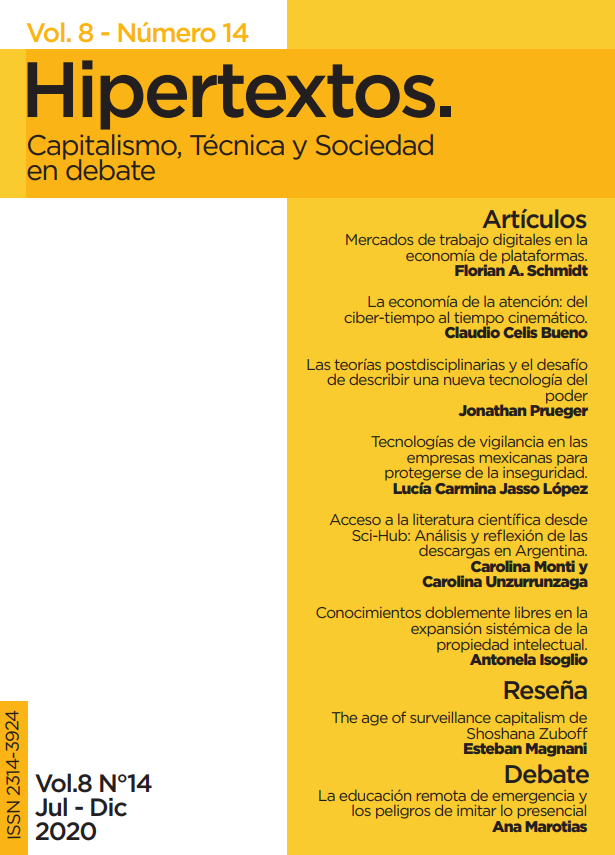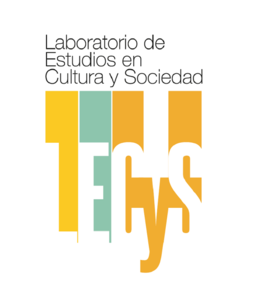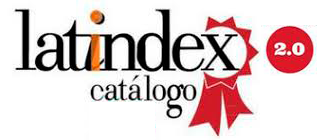The attention economy: From cyber-time to cinematic time
DOI:
https://doi.org/10.24215/23143924e019Keywords:
Bernard Stiegler, originary technicity, temporality, information, capitalAbstract
This article explores the temporal dimension of the attention economy through Bernard Stiegler’s notion of cinematic time. The attention economy is a concept forged within the field of political economy to explain the growing value of attention in an information-rich world. This implies a growing discrepancy between the finite nature of human time required to pay attention to and process the available information, and the inhuman speed at which that information flows and accumulates. The problem with this definition of the temporality of the attention economy is that it naturalizes a given notion of human time that is then used to evaluate the negative effects of information technologies. In this sense, human time is proposed as a concept devoid of any kind of historical transformation. Contrary to this definition of the temporality of the attention economy, this article uses Bernard Stiegler's concept of cinematic time to examine how human time and cyber-time mutually constitute each other.
Downloads
References
Adorno, T., & Horkheimer, M. (1998). Dialéctica de la ilustración. Madrid: Trotta.
Bazin, A. (1990). ¿Qué es el cine? Madrid: Ediciones Rialp.
Berardi, F. (2014). La Sublevación. Buenos Aires: Hekht Libros.
Bradley, A. (2011). Originary Technicity: The Theory of Technology from Marx to Derrida. Basingstoke: Palgrave Macmillan.
Buck-Morss, S. (1994). The cinema screen as prosthesis of perception: a historical account. In C. N. Seremetakis (Ed.), The Senses Still. Chicago: University of Chicago Press.
Casebier, A. (1991). Film and Phenomenology: Toward a Realist Theory of Cinematic Representation. Cambridge University Press.
Celis Bueno, C. (2017). The Attention Economy: Labour, Time, and Power in Cognitive Capitalism. London: Rowman & Littlefield.
Crary, J. (2013). 24/7: Late Capitalism and the End of Sleep. New York: Verso.
Crogan, P. (2006). Essential Viewing. Film-Philosophy, 10, 2. http://www.film-philosophy.com/2006v10n2/crogan.pdf
Doanne, M. A. (2016). La emergencia del tiempo cinemático. Madrid: Cendeac.
Hayles, K. (2007). Hyper and deep attention: The generational divide in cognitive modes. Profession, 187-199. https://www.jstor.org/stable/25595866
Marazzi, C. (2003). El sitio de los calcetines: el giro lingüístico de la economía y sus efectos sobre la política. Madrid: Akal.
Marx, K. (2009). Grundrisse II: Elementos fundamentales para la crítica de la economía política (1857-1858). México: Siglo XXI.
Shaw, S. (2008). Film consciousness: from phenomenology to Deleuze. Chicago: University of Michigan Press.
Simon, H. A. (1971). Designing organizations for an information-rich world. In M. Greenberg (Ed.), Computers, Communication, and the Public Interest. Maryland: Johns Hopkins University Press. https://digitalcollections.library.cmu.edu/awweb/awarchive?type=file&item=33748
Sobchack, V. (1992). The address of the eye: a phenomenology of film experience. Princeton University Press.
Srnicek, N. (2018) Capitalismo de plataformas. Buenos Aires: Caja negra.
Stiegler, B. (2004). La técnica y el tiempo 3: El tiempo del cine y la cuestión del malestar. Hondarribia: Hiru.
Stiegler, B. (2006). Anamnesis and Hypomnesis: The memories of desire. In A. Bradley & L. Armand (Eds.), Technicity (pp. 15-41). Prague: Litteraria Pragensia.
Stiegler, B. (2011a). Suffocated Desire or how the Cultural Industry destroys the Individual: Contribution to a Theory of Mass Consumption. Parrhesia, 13, 52-61. http://xenopraxis.net/readings/stiegler_suffocateddesire.pdf
Stiegler, B. (2011b). The Decadence of Industrial Democracies (Vol. 1). Cambridge: Polity.
Stiegler, B. (2012). Relational Ecology and the Digital Pharmakon. Culture Machine, 13, 1-19. https://culturemachine.net/wp-content/uploads/2019/01/464-1026-1-PB.pdf

























